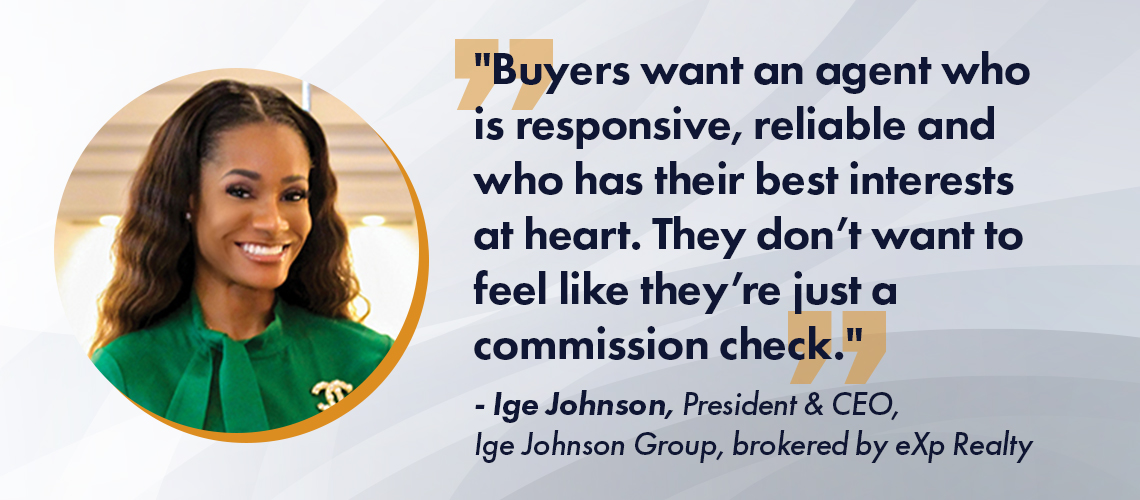Taking a proactive approach to managing buyer expectations—whether they’re a first-timer or they’ve been through the process a time or two—is one of the best ways to ensure that the journey is both smooth and stress-free.
It will also go a long way toward making the process more enjoyable for everyone involved.
As Ken Baris, CEO of Berkshire Hathaway HomeServices Jordan Baris Realty notes, communication is the best way for real estate professionals to stay ahead when it comes to managing the expectations of their buyers.
“Not only should your communication be frequent, consistent and meaningful, it should also be backed up with a CRM and email alerts of properties hitting the market, as well as properties that are selling,” explains Baris. “Regular phone calls enhance the relationship and provide the opportunity to find out what the buyer is thinking,” he adds.
“Real estate professionals must constantly communicate and build on their strong bond with their buyers,” concurs Creig Northrop, founder and CEO of Northrop Realty. “And with more than 95% of buyers purchasing their home using an agent, finding your clients’ preferred communication method is good practice,” he says.

While communication is key, preparing clients for the reality of the home-buying process is a lot more involved than staying in constant contact.
In fact, RISMedia’s Reader Survey shed light on the key components involved in managing buyer expectations, none of which should come as a surprise, and all of which should be added to your repertoire if you’re looking to double down on the service you provide prospective buyers.
Following are the top 11 ways real estate professionals can successfully manage expectations when working with buyers, no matter the market.
1. Make yourself available. Now more than ever, prospective buyers expect the agent they’ve chosen to guide them through the process to be available when questions arise or to schedule property viewings. Real estate isn’t a nine-to-five job, and while consumers demand instant gratification, it’s important to set boundaries from the beginning as far as when you’re available to field phone calls, texts and emails.
“Buyers want an agent who is responsive, reliable and who has their best interests at heart,” says Ige Johnson, president and CEO of Ige Johnson Group, brokered by eXp Realty. “They don’t want to feel like they’re just a commission check. They want an agent who will be a partner in the process and help them navigate what can be a very confusing time.”
2. Prove that you can handle negotiations and close a deal. Getting clients to the closing table is often a challenging proposition, but by mastering the art of negotiation, real estate professionals will be one step closer to bringing buyers and sellers together…and keeping deals from falling apart at the eleventh hour.
3. Show your client that you’re educated as to market realities. The real estate market is moving faster than ever before, and as we continue to contend with rising mortgage rates and the Fed doing everything it can to stave off inflation—and everything in between—keeping up with the ever-evolving market is a full-time job. But as buyers prepare for the biggest financial transaction of their lives, they must be presented with a clear picture of what’s transpiring in their local market.
“Utilizing your knowledge of the current market creates the confidence your clients are looking for, which builds their trust in you and the process,” says Northrop.
4. Provide trusted vendor recommendations. Your relationship with a client doesn’t end as soon as you get them in their dream home. Become their go-to resource for all their homeownership needs by connecting them with professionals you trust in their new neighborhood to see them through regular upkeep, remodels, etc.
“Many buyers are looking for assistance with financing, referrals of attorneys, title companies, contractors, architects and other professionals,” says Baris. “And they expect these referrals to be people who are outstanding.”

5. Share facts/statistics about the area. No matter the market, an educated buyer will always be in the best position when it comes to making decisions. As their real estate agent, it’s your job to arm them with the information they need to achieve their real estate dreams. Prepare your clients for the task at hand by providing facts and statistics about the homes in the area(s) in which they’re looking—and don’t forget to offer information about the community itself.
“Buyers today expect a hyperlocal expert, not a generalist,” says Mark Johnson. “Buyers can find generalists everywhere, but being the expert in your local neighborhood, your local zip code, your community and your city is a true distinction.”
6. Make closing day easy. One of the most exciting days along the journey to homeownership, closing day signifies the next chapter in the lives of your clients. Keep the stress at bay and the process moving smoothly for everyone involved by making sure everything is in order prior to taking a seat at the (closing) table.
7. Manage the inspection. When it comes to the home inspection, time is of the essence—but the last thing you want to do is leave your client hanging when inspection day rolls around. Take the time to prepare your clients in regard to what the process involves and recommend an inspector you have a good working relationship with. Last but not least, schedule the inspection when you’re available so that you can be by your client’s side should questions or concerns arise.
8. Help your client understand the financing options that are available. While conventional mortgages are often considered the most common home-financing tool, there are other options that may make more sense given the buyer’s situation.
“Today, we need to coach buyers on the mortgage industry. That includes reviewing how financing works and discussing mortgage buy-downs and how they can be included in an offer for a seller to participate in the cost. It’s also important to consider whether an adjustable-rate mortgage makes sense based on how long a buyer expects to stay in a property,” explains Baris.
“This is a market of opportunity given the rapid increase of interest rates,” he adds.
9. Encourage your client to get pre-approved for a loan. Being pre-approved for a mortgage will put your clients in a powerful position by showing them exactly how much they can afford. It will also help guide the search from your end as their real estate professional. The sooner you know what the client can afford, the sooner you’ll be able to hone in on the properties within their budget—saving valuable time and effort on everyone’s part.
10. Keep the process moving by scheduling multiple open houses and follow-up meetings. As any real estate professional can attest, the home search process takes time (and plenty of it), so you’ll want to do everything you can to streamline the process as much as humanly possible. To that end, keep things moving by making the most of the time spent with your clients.
11. Share common sources of buyer’s remorse. Buyer’s remorse is alive and well, especially considering that nearly 70% of buyers surveyed in HomeLight’s 2022 Buyer and Seller Insights Report said they have at least one regret about their home-buying experience. Sharing this type of intel with your buyer clients should be a priority, as the last thing you want is for them to regret their decision.
“Buyers also appreciate agents who are proactive and anticipate their needs,” says Ige Johnson. “For example, an agent who follows up quickly after showings or sends listings that match their criteria as soon as they come on the market.”



